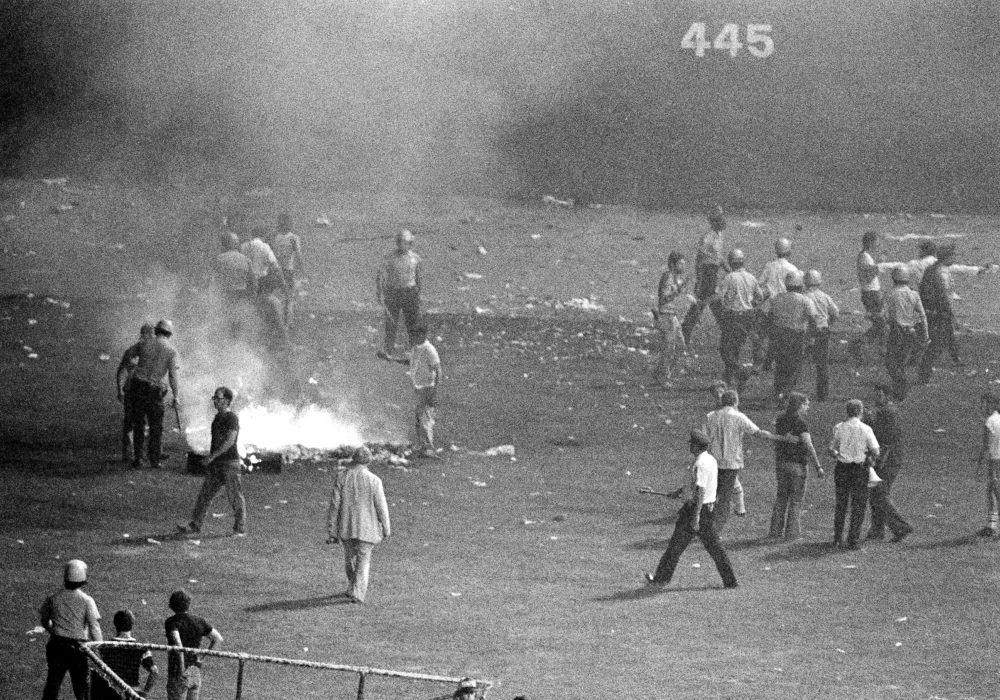
Summer 1979: I was too young and too dumb to understand that the intense backlash to Disco, in addition to being typical to American fads rising and falling, had a great deal of racist and homophobic energy behind it. All I knew, then, was that Disco Sucked and the white I mean right people were fighting the good fight that had to be won so…Kiss, my favorite band, could appropriate this trend for their insufferable hit single “I Was Made For Lovin’ You.” Irony abounds, and young, dumb nine-year-olds never fathom things like accountability, history being made, and anything other than being dumb and young.
This poem “Disco’s Last Dance” (which appears in my recent collection Kinds of Blue) is inspired by this odd, unfortunate, and epochal evening, an immediate metaphor for so many things, an occasion that manages to inspire shame and nostalgia in equal measure, much like 1979 itself.
“Disco’s Last Dance*”
(*On July 12, 1979, “Disco Demolition” night at Chicago’s Comiskey Part deteriorated into a near-riot: the 98-cent discount tickets for anyone who brought a disco record to destroy drew an overflow crowd, some of whom stormed the field, causing the game to be canceled.)
Death Before Disco, some of us said (others, opportunistic or at least disc jockeys, wore it on t-shirts—their sentiment as sincere as their lives weren’t). In fairness, backlash after ubiquity is the American Way: whether it involves athletes or actors or pop culture icons writ large, we root for you until we decide you’ve had enough of whatever you’ve been given, be it fame, fortune, free love, or the whole unholy trinity. Also, Disco was the soundtrack to whatever was happening at Studio 54, that WASP’s nest of iniquity where unapproachable people went to be seen doing things most of us would never do; where the incorruptible Pelé and unkillable Kissinger stood afro-to-asshole, Mick Jagger and other jagoffs waiting in the wings, full wallets muffling their falls on feverish Saturday nights. Envious and out of other options, we decided to despise them. Oh, and this musical style managed to be at once too black and too gay, making it that much easier to misunderstand and malign. But how many of us were hazily aware of a familiar undercurrent—resurfacing throughout the twentieth century like a contagious disease—that involved certain cultures and the imperative to stymie them? How many of us failed to grasp we were being fed a narrative almost too easy to swallow, all artificial and fattening, like our devotion to Hamburger Helper and Shake ‘N Bake, which epitomized, we thought, our mothers’ culinary game? We, who didn’t realize Howard Cosell sported a toupée, blissfully oblivious to what this signified, and the greedy ways some men grasp at short-cuts to stay relevant past their shelf-lives. Or what Donna Summers really meant when she sang about feeling love, not to mention what the word love alludes to in pretty much all pop songs. Or that the Village People, no matter what costumes they put on, were clearly playing for the wrong team. Did Disco Balls burn too brightly, leaving the dance lines on Soul Train blinded by their light, so many sweaty deities in leisure suits? Did Walter Cronkite fail to warn us that’s the way it is as a decade died down and, crazy from the summer heat or simply looking for an excuse, the geniuses running the White Sox (because of course) had an idea: Get a bunch of drunk guys in one spot and give them a target. We applauded the televised transmission of salty earthlings flipping 45s onto the field, winning one for the Gipper and clearing a safe space for synthesizers and drum machines. Like so many soldiers of misfortune, these Macho Men reclaimed the soul of our nation according to the Gospel of beer-fueled dumpster fires. Look again at this unpoliced line-up and notice history pointing in either direction: can’t you see hidden men in hoods, rallying around a tree for a photo op, or a trucker’s cap crashing onto a lunch counter, or a cop dropping his baton on another colored crime in progress, or enraptured folks in red hats receiving marching orders from another old man—unembarrassable with his specious hair and oversized suit—who once blew rails in Big Apple bathrooms, a veteran of the Disco Daze doing the YMCA on stage without irony, promising to provide everything God, spinning vinyl in the VIP section, hasn’t gotten around to delivering?
You can watch me read this poem at a recent event (the entire recording highly recommended) at 58:55 of the video, below.
